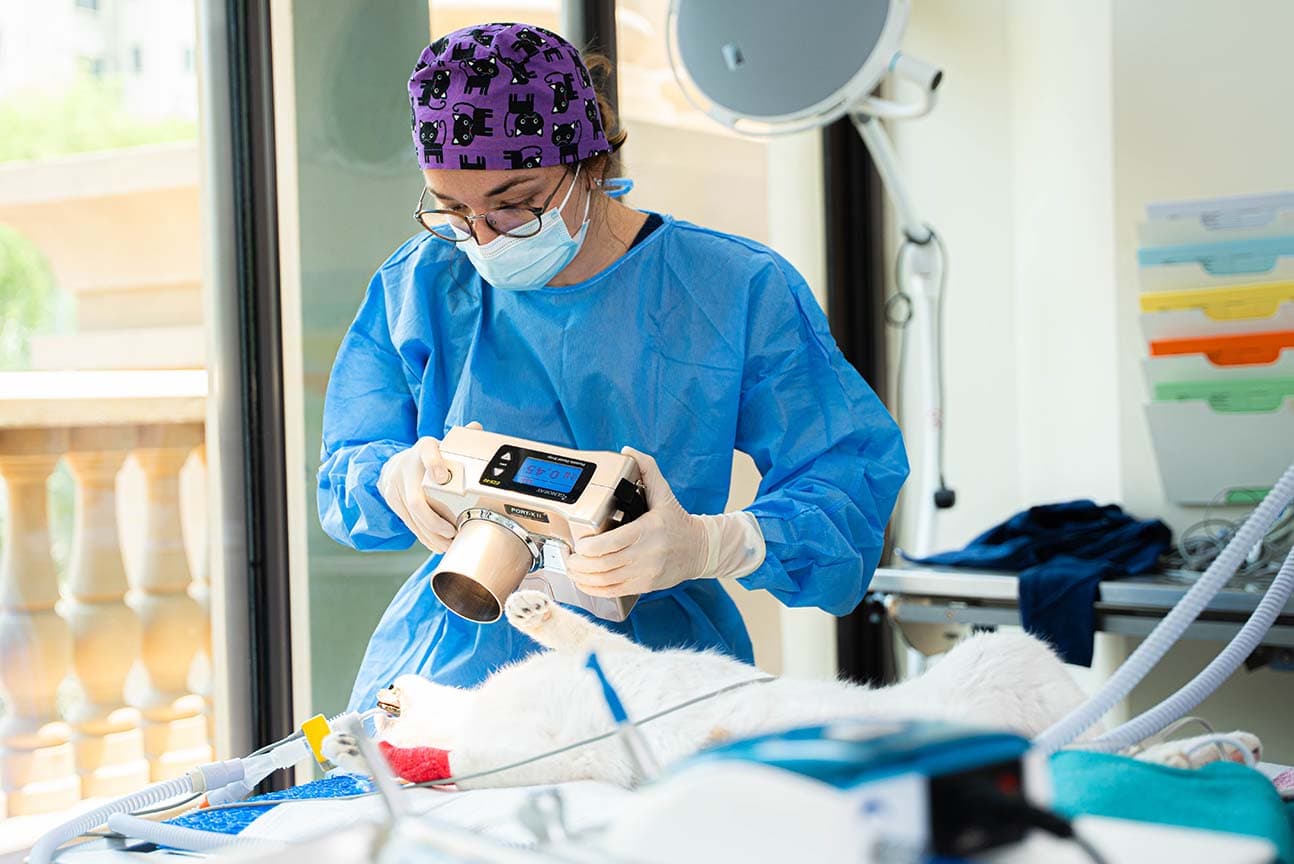Reviewed by Dr. Ionut Rusu
Updated on 08/09/2025
Reading time 4 min.
Overview
Severity: Low
Life stage: All
Urinary tract infections in cats happen when bacteria invade the urinary system, affecting the kidneys, ureters, bladder and urethra. In Dubai’s unique climate, certain factors can increase your cat’s risk of developing these uncomfortable and potentially serious conditions. Knowing the signs and when to seek veterinary care is important for cat owners in Dubai.
What Are Urinary Tract Infections in Cats?
Your cat’s urinary system works like a sophisticated filtration system. Urine is produced in the kidneys, stored in the bladder, and expelled through the urethra. When bacteria, usually from the skin or bottom, enter this system and overwhelm your cat’s natural defences, a urinary tract infection (UTI) develops.
In Dubai’s hot, dry climate, cats may be particularly susceptible due to dehydration risks and reduced water intake, which can lead to concentrated urine and bladder irritation. Only 1-2% of all cats develop bacterial UTIs, but this number is higher in older cats.
Types of Urinary Tract Infections
Lower Urinary Tract Infections
- Bacteria enter through the vulva (females) or penis (males)
- They can also develop secondary to bladder stones
- Infection leads to inflammation and weakening of the bladder’s protective layers
Upper Urinary Tract Infections
- Often develop from untreated lower UTIs
- Affect the kidneys and can be life-threatening
- These infections are more serious, as the kidneys are vital for blood filtration
- Upper UTIs always require immediate veterinary attention
Symptoms: Recognising UTI Signs in Your Cat
Lower UTI Symptoms
- Straining or taking longer to pass urine
- Yowling or crying when urinating (shows pain)
- Frequent urinating in small amounts, often with blood
- Urinating outside the litter tray
- Behaviour changes: withdrawn, restless or grumpy
- Lethargy and reduced appetite
Upper UTI Symptoms
- Symptoms may include any of the lower UTI signs
- Severe vomiting and diarrhoea
- Complete loss of appetite
- Extreme lethargy
- Abdominal pain
- Fever, trembling, and shaking
- Shock and collapse
If you notice these symptoms, contact your local veterinarian as soon as possible.
Risk Factors: Which Cats Are Most Vulnerable?
General Risk Factors
- Female cats: Their shorter, wider urethra makes bacterial entry easier
- Older cats: Because they have weaker immune defences
- Underlying conditions: Including hyperthyroidism, chronic kidney disease, diabetes, and urolithiasis
- Obesity: Compromises immune function
- Taking certain medications: Steroids, anti-cancer drugs
- Having bladder or kidney cancer
Dubai-Specific Risk Factors:
- Indoor lifestyle: Many Dubai cats are indoor-only, increasing stress levels
- Reduced water intake: Air conditioning and dry climate can decrease thirst
- Limited exercise: Apartment living may reduce activity levels and increase stress
- Diet changes: Pet foods may differ from cats’ previous diets
Important: UTIs don’t spread between cats or from cats to humans, but cats in the same household with similar risk factors may develop UTIs independently.
Diagnosis: How Vets Identify UTIs
Your veterinarian will usually perform a urinalysis to identify bacteria and assess other elements of your cat’s urine. In some cases, a urine culture may be necessary to determine the specific bacteria and the most effective antibiotic. In addition, blood tests may be recommended to check kidney function and overall health.
If your cat’s symptoms don’t improve, or if they suffer from repeated infections, your vet may recommend further tests such as:
- Ultrasound scans: To visualise the bladder wall and kidney structure
- X-rays: Detect bladder stones
- CT scans: For complex cases
Treatment: Veterinary Approaches
Veterinary Treatment Options
Antibiotics:
- They are essential for bacterial UTIs
- A bacterial culture helps choose the most effective antibiotic
- A course typically lasts 7 to 14 days
- Follow-up testing is often recommended to ensure the infection has cleared
Supportive Care:
- Anti-inflammatory painkillers to help with discomfort
- Bladder supplements (may be recommended to continue long-term)
- Intravenous fluids for dehydration (particularly important in Dubai’s climate)
Prescription Diets:
- Specifically formulated to prevent crystals and stones, keep urine at a healthy pH, and encourage better hydration. These help manage the condition and reduce the risk of future flare-ups.
- Your vet will help you decide which urinary diet is best for your cat. They can recommend the most effective option based on your cat’s specific condition, health history, and test results.
Treating Underlying Causes:
- Managing diabetes, kidney disease, or hyperthyroidism
- Surgical removal of bladder stones if present
- Stress management
Home Care: Supporting Your Cat’s Recovery
Essential Home Care
- Give all prescribed medicines at the correct times and doses
- Improve water intake:
- Feed wet food during recovery
- Add water to dry food if needed
- Offer ice cubes as treatsImprove water intake:
- Ensure adequate rest and comfort. Provide quiet, air-conditioned spaces
- Clean any faeces from fur, especially if diarrhoea occurs
- Monitor urination for changes in frequency, colour, or difficulty
Dubai-Specific Home Care
- Maintain consistent, comfortable temperature (22-24°C)
- Consider a humidifier if the air is very dry
- Use filtered water if concerned about tap water quality
What Not to Do:
- Never use home remedies or over-the-counter human medications
- Don’t stop antibiotics early, even if symptoms improve
- Don’t restrict water access
What to expect
With proper treatment, most cats recover from an uncomplicated urinary tract infection within 1–2 weeks. Long-term care is essential for cats suffering from urinary tract infections, as they are prone to recurrent issues. By following simple prevention tips, you can help lower the risk of future infections.
Prevention: Keeping Your Cat UTI-Free
General
- Help your cat maintain a healthy weight: Obesity increases UTI risk
- Feed an age-appropriate, high-quality diet
- Encourage exercise: Use interactive toys and climbing structures
- Regular grooming: Keep the bottom area clean, especially for long-haired cats
- Bladder supplements: When recommended by your vet
Dubai-Specific Strategies
Increase water intake:
- Use water fountains to encourage drinking
- Give ice cubes as treats during hot weather
- Provide multiple water sources throughout your home
Environmental Management:
- Maintain a consistent indoor temperature and humidity levels (avoid dramatic changes)
Lifestyle Adaptations:
- Create vertical spaces for exercise in apartments
- Provide multiple litter trays (one per cat plus one extra)
- Use high-quality, dust-free litter
- Maintain consistent feeding and routine schedules
Health Monitoring:
- Regular vet check-ups (every 6-12 months)
- Watch for early signs of urinary issues and other general health concerns
When to Seek Emergency Care
Immediate Veterinary Attention Required:
- Complete inability to urinate (life-threatening emergency)
- Collapse or shock
- Severe trembling
- Rapidly worsening symptoms despite treatment
- Signs of severe dehydration
Modern Vet Hospital in Dubai has excellent 24-hour veterinary facilities, so don’t hesitate to seek help if you’re concerned about your cat’s condition.
Concerned about urinary symptoms in your cat? Book a checkup or emergency appointment at Modern Vet Hospital in Dubai. Our experienced veterinary team provides comprehensive UTI diagnostics, plus immediate treatment for bladder infections and kidney complications.
From routine urinary health monitoring to urgent UTI emergencies, Modern Vet Hospital is your trusted veterinary clinic in Dubai for complete, compassionate feline urinary care.
Share this, choose your platform!
Reviewed by
Dr. Ionut Rusu
USAMV, RCVS
Dr. Ionut Rusu is a senior veterinarian with nearly a decade of successful experience in the field. He graduated in 2014 from the University of Agricultural Sciences and Veterinary Medicine (USAMV) in Cluj-Napoca, Romania.


